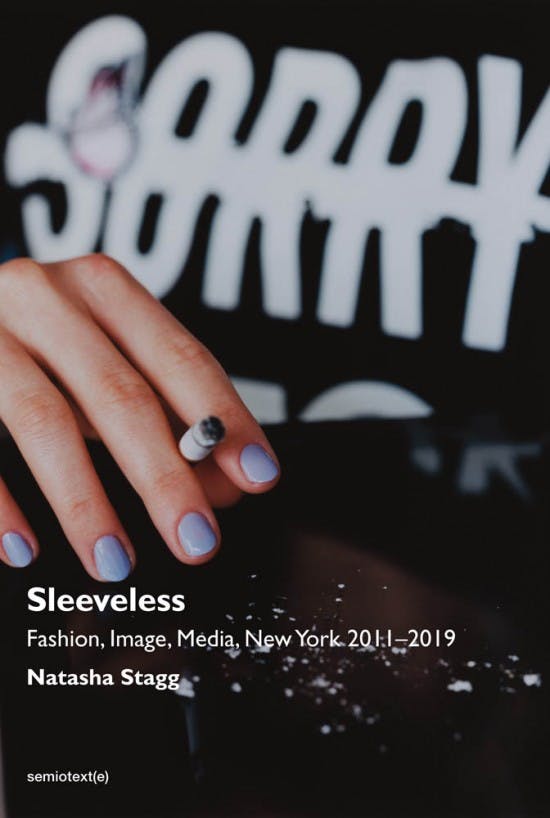A good millennial is hard to fool. Surveys, Natasha Stagg’s debut novel, followed a young influencer named Colleen who, in her online tryst with fame, embodied the cynicism and know-how of the digital era. For Colleen, the internet was a set of levers to manipulate, its moral compromises as quantifiable and necessary as collateral on a loan. Surveys was literature for a generation of live-tweeters, with a protagonist who narrated her own arc like a slow-motion car crash.

Stagg’s follow-up to that novel, Sleeveless: Fashion, Image, Media, New York 2011-2019, collects a wide range of her writing, from short stories to essays on Balenciaga and celebrity culture. Most of these pieces are set in New York, where the proliferation of capital and excess has long overtaken the city’s capacity to shock and delight. Now, the perks have “started to feel more like obligations.” Creative people network in “sorority-like conditions,” reading the same books and doing the same drugs. The city is so far beyond its heyday that the millennials moving in have no illusions about the ranks they’re joining: “It’s all interns.” Everything is past its prime, including the act of declaring something past its prime.
This malaise is Sleeveless’s specialty. Whether it’s a Chanel-suited fundraiser or the after-party for an “underwear exhibition,” Stagg relates her observations and arguments in the same flat affect, making it difficult to distinguish the fictional segments of Sleeveless from the non-fictional. The blurring feels appropriate at a time when confessional Instagram captions often double as ad copy. If this is the Age of Content, Stagg is interested in finding its literary boundaries.
How is writing today defined by our historical and technological moment? Critics have heralded the arrival of “internet novels” such as Joshua Cohen’s Book of Numbers, or work by gchat aficionado Tao Lin, whose characters tap out their relationships in text and instant messenger. Sleeveless doesn’t attempt this kind of verisimilitude, rarely foregrounding electronic devices or the sparse phraseology of online dialogue. Instead, Stagg approximates the internet by folding its arbitrariness and disorder into the structure of her book. Sleeveless starts with a diaristic account of New York, followed by a vignette in the third person, then a chunk of essays. Though it spans almost a decade, the years are shuffled so that the main narrative begins in 2017 and closes on the summer of 2018. Stagg withholds from her reader a sense of arriving someplace, or indeed, having journeyed at all.
This looping treatment of events (“We talk in circles, we don’t get anywhere”) reproduces the internet’s ability to distend time, zipping through decades in a single click. The same themes are discussed, again and again, through shifting formats and avatars. A short story about a reality TV contestant may foreshadow a theoretical essay on Kim Kardashian. Stagg picks apart modern dating by examining her own experiences and giving us picturesque vignettes about young people living with bedbugs. Meanwhile, the many narrators in these pieces make it hard to tell who exactly is speaking. Certain details align fleetingly with the author’s biography, while other sections are related through third-person characters with distinctly different lives.
Sleeveless opens at a restaurant in Manhattan, where the narrator is listening to people at the next table over trade declarations on the city’s faded charms. She overhears that “parties” and “getting fucked up” are still viable activities, though the latter may soon be “going out of style.” She notices the group’s names, occupations, and the almost nostalgic tableau they form: four high-powered friends gabbing over “tequila cocktails,” an early-aughts ideal of urban sociality with witty banter as its garnish. The narrator, meanwhile, strikes a more contemporary pose, alone with her laptop open, in good freelancer form. “You can’t move here and expect to be able to live the way the locals do,” she remarks—who today can afford “deep-rooted friendships,” anyway?
Eavesdropping might be the only enduring tradition the city has left, and Stagg weaponizes this outsider-insider sensibility wherever she goes, feeding all the best lines to her reader. “Women are so trendy right now,” claims someone at a magazine launch; we witness another individual “identify” as “hairless.” Stagg’s powers of observation benefit from her position on the margins, and when she prowls the Upper East Side she does so with an eye specially attuned to the mustiness of old glamour. She lists the wedge salads, the big diamonds, the dogs that look like they trotted out of a “1950s painting.” The residents in this neighborhood are universally “awful to talk to and great to eavesdrop on.” One of them brags about having recently taken the subway. New York is the mirror plane of social media, where voyeurs are free to relate every observation, and “the best thing to be … is watched and heard.”
Even as Sleeveless perfectly inhabits the disorienting feel of our digital times, Stagg also seems self-consciously frustrated with the book’s limits. While the internet induces confusion and boredom, it also possesses its own corners of rapture, spaces of belonging and discovery where emotions pitch at a joyous, almost hysterical key. How to portray this without lapsing into cliché? Stagg herself notes that when she thinks of the internet, she feels “crushed … maybe like I have an infatuation with everyone at once.” She adds later: “It is hard to write about how high it makes me feel.”
If the traditional bildungsroman metes out knowledge in slow and painful bursts, Stagg seems to possess, at the outset, a perfect understanding of our turbo-connected era. Sleeveless resonates with recent books by Sally Rooney, Halle Butler, and Ottessa Moshfegh, in which young women come of age but never quite feel a loss of innocence, often because they started out already familiar with the world’s limits and hypocrisies.
At the opening of My Year of Rest and Relaxation the protagonist knows too much, and spends her time trying to reproduce ignorance through an Ambien-assisted campaign against consciousness. In Sally Rooney’s novels, characters couple and de-couple with a precocious awareness of power differentials like class, age, and education. One woman observes knowingly to another that capitalism “harnesses ‘love’ for profit”—this in an old IM chat, years before the book’s central romance even begins. The individuals in Rooney’s novels are equipped with an exhaustive awareness of material injustices, leaving little space for a political education. If a character changes her mind or loses her illusions, the disenchantment happens on an emotional level—the result of an interpersonal relationship rather than an analysis of society.
These writers inhabit a sense of exhausted stagnation—the quality of being young and suddenly finding, in your hand, the frayed end of some narrative rope. The impression that reality is limited and predictable means that validation or hope, if they’re to be found, exist in the smaller but no less significant enclosure of the personal. “I want to go on the perfect date with my crush and live it again every day forever,” writes Stagg, in a rare and wistful moment. “I want to be a good person, to which good things like this happen.”
